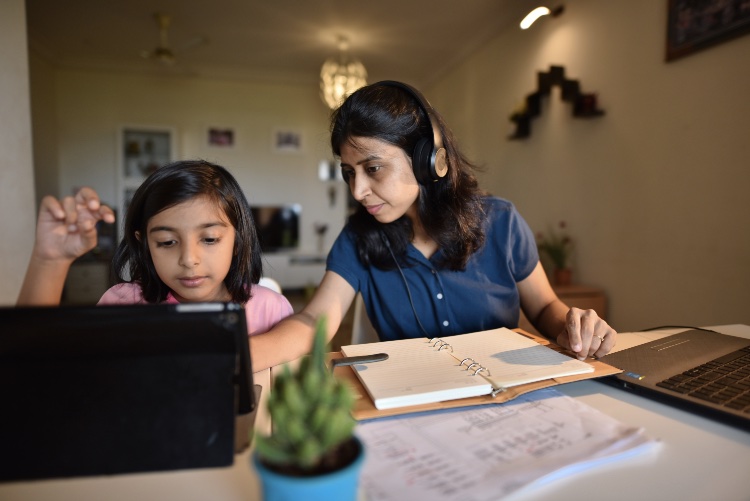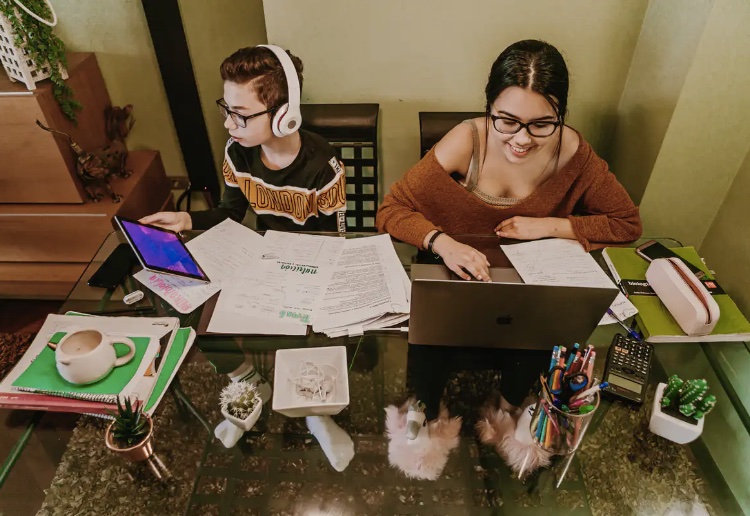With many schools closed due to the COVID-19 outbreak – and uncertainty surrounding the decision to transition kids back to schools, parents are encouraged to look into homeschooling their kids.
As a sociologist who has interviewed dozens of homeschooling parents to learn which practices work best, I know that first-timers can quickly find themselves feeling unprepared and overwhelmed. With that in mind, here are six tips for parents who educate their children at home.
Top Tips For Homeschooling Your Children
1. Don’t copy a regular classroom
When many of the parents I interviewed first started home-schooling, they tried to make their homes look and feel like a traditional school environment. They set up desks and decorated the walls with the kinds of things you’d see in a classroom. They set a schedule and positioned themselves as teacher. But they soon came to see this as a rookie mistake that causes a lot of stress and pressure.
A woman I’ll call Beth, a 37-year-old mother who has been homeschooling her four children for four years, warns parents not do “public school at home” because “it doesn’t really work.”
“Don’t make it look like public school at your kitchen table,” Beth says. “Just have more conversations with kids and see who they are and that will help you develop how you want to do school because you’ll know what speaks to them.”
2. Don’t spend much on curriculum
You might feel the urge to rush to buy a “boxed curriculum,” a set of grade-level materials that can cost more than $1,000. Before you do that, try to find free educational lessons on websites such as Khan Academy and Learning Games for Kids. Additionally, these homeschooling parents often used their local libraries for books and programming, although during the pandemic they are now using libraries’ online and e-book resources only. They also use documentaries found online and through TV streaming services, such as ABC, Netflix, Stan and Amazon Prime.
Also, most home-schooling parents that I interviewed didn’t subscribe to just one method or program. Instead, they piece together lessons that were unique to their child using a blend of commercial and free materials.
3. Be mindful of your time
The parents in my study, which is forthcoming, spent an average of 3.5 hours a day home-schooling. At first, this might seem like much less than the average of six to seven hours a day spent in the traditional public school classroom. However, one key difference is that at home, your child is receiving a one-on-one education instead of splitting one teacher’s attention with 25 or so other students. Instead of trying to have school all day, focus on quality over quantity.
“Megan,” a homeschooling mother of three, said she has often seen home-schooling parents “freaking out” because they want to give their children four or five hours of schooling a day. “One-on-one instruction is way more efficient than in a class of 20 to 30 kids,” Megan says. “And you don’t need to be schooling from nine to three every day solid.”
4. Be flexible
Many of the parents I spoke with stressed the importance of being flexible and doing what works for your family. Because children are now learning at home, an environment in which they are used to being relaxed, it could be beneficial to allow them to sit on the floor, to do their work in the evening, or to do school work on Saturdays instead of Wednesdays. Maybe your child will fare better completing all of their math on Tuesdays but spreading science lessons out over the week. Be willing to try new things if something isn’t working for your family.
“Be flexible. Give yourself a lot of grace because there’s definitely a learning period for everybody,” says “Gayle,” 36, a home-schooling mother of five. “And it takes a while to get the hang of it. And just figure out what works for you.”

5. Hire experts
Homeschooling parents don’t always take on the full burden of their child’s education themselves, particularly when their children get older and into tough subjects. Many hire online tutors. Sometimes children have an interest in something that their parent doesn’t know much about, such as a foreign language or astrophysics or organic chemistry. These parents turn to tutors and specialized classes to make sure their child gets the knowledge they need to succeed and can pursue subjects that spark their curiosity.
One such place to find tutors is Outschool, which offers classes, some with certified teachers and experts. The classes can cost anywhere from $10 for a one-time class to $200 to $300 for an entire semester. If your child needs more one-on-one instruction, the average cost of a personal tutor can range from $20 to $80 per hour, depending on the subject. Another good resource for tutoring is to tap into your local university to find both undergraduate and graduate students who may be looking to make some extra cash teaching children. Due to the closure of the majority of universities and music venues, online tutoring is becoming even easier to find, as many people have turned to the internet, using platforms such as Zoom, to continue to share their knowledge. Some are even offering their services for free.
6. Join support groups
Many parents in my research turned to Facebook and Google to find local and virtual home-schooling support groups. These groups are places where parents go to air their frustrations, seek playdates (even of the online, social distancing variety), review curriculum, ask questions and find resources. This would be particularly helpful before making decisions on curriculum or outsourcing. Cast a wide net when looking for support. If you’re nervous about joining because you feel as if you aren’t truly home-schooling, reach out to the admins of the group to see if it’s a good fit.
For many of these homeschooling parents, it was very helpful to have a group of like-minded people to turn to during tough times. “That’s one of things I like about the co-op … there’s other mums,” says “Brianna,” homeschooling mother of two. “So, during lunchtime, we can say, ‘I had a horrible day.‘ ‘How do you do this or how do you do that?’ And a lot of things have come about just talking to people and in forming a community, because I don’t think you can home-school on your own without some type of support network.”
[Get the best of The Conversation, every weekend. Sign up for our weekly newsletter.]![]()
Erin Baker, Ph.D. Candidate, Sociology, Wayne State University
This article is republished from The Conversation under a Creative Commons license. Read the original article.




















8:32 am
11:44 am
12:41 pm
6:09 pm
4:09 pm
-

-
-
Ellen replied
- 01 May 2020 , 7:32 am

Reply3:51 pm
3:24 pm
2:06 pm
11:21 am
9:21 am
7:45 am
6:37 am
1:26 am
1:24 am
9:21 pm
8:25 pm
-

-
-
sunflower replied
- 16 Aug 2020 , 12:40 pm
Reply5:23 pm
3:26 pm
1:02 pm
12:42 pm
- 1
- 2
- »
Post a commentTo post a review/comment please join us or login so we can allocate your points.